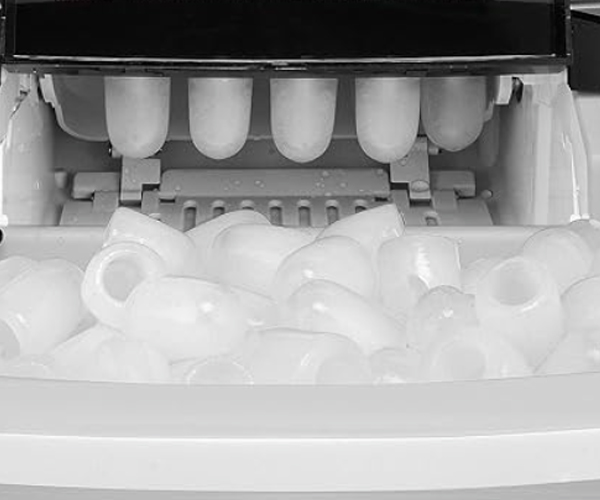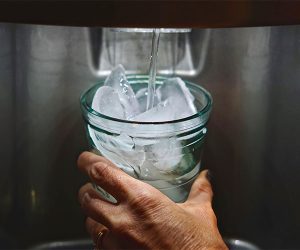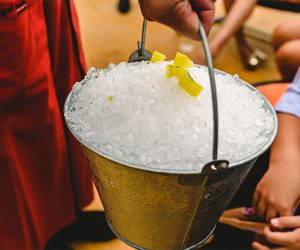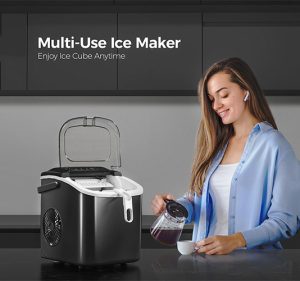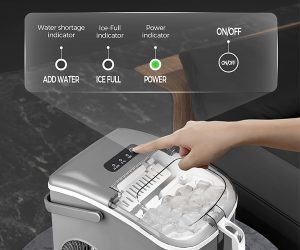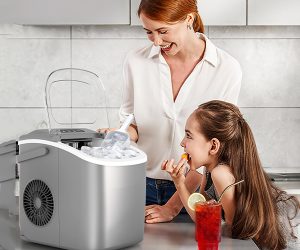When considering the best water for your countertop ice maker, it’s important to prioritize both the quality of the ice produced and the longevity of the machine. Here’s an in-depth guide to help you make an informed decision
Introduction
When using a home countertop ice maker, filtered tap water is highly recommended due to several benefits that enhance both the quality of ice and the longevity of the machine.https://amzn.to/4bZtPbU
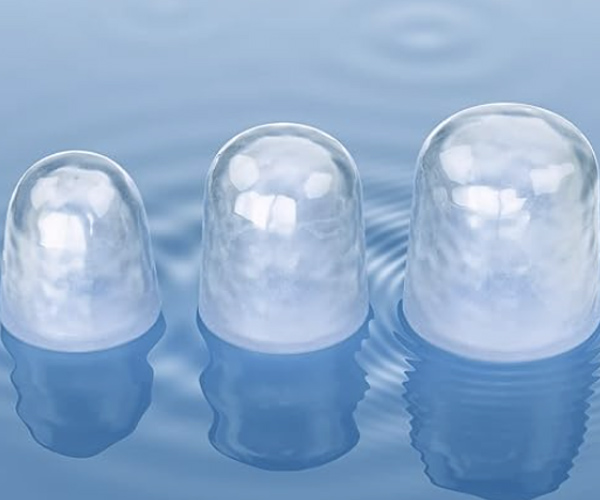
Benefits of Using Filtered Tap Water
- Improved Ice Quality:
- Filtered tap water removes impurities such as chlorine, heavy metals, and other contaminants, resulting in clearer, better-tasting ice. This ensures that your beverages are not tainted by any off-flavors that can come from unfiltered water .
- The filtration process retains essential minerals that help in forming solid ice cubes, which are less likely to be cloudy or soft.
- Machine Longevity:
- Using filtered water helps prevent the buildup of minerals such as calcium and magnesium, which can cause scale deposits. These deposits can damage the internal components of your ice maker, leading to reduced efficiency and potential breakdowns over time.
- Regular use of filtered water reduces the need for frequent cleaning and maintenance, extending the lifespan of your ice maker.
- Health Benefits:
- By removing bacteria, chemicals, and other harmful substances, filtered water ensures that the ice produced is safe for consumption. This is particularly important if the ice is used directly in drinks, as it minimizes the risk of ingesting harmful contaminants .
Best Practices for Using Filtered Tap Water
- Regular Filter Replacement: Ensure that the water filter is replaced as per the manufacturer’s instructions to maintain the effectiveness of the filtration process. This will ensure consistent ice quality and protect the machine from potential damage .
- Clean the Ice Maker Regularly: Even with filtered water, it is important to clean the ice maker periodically. This helps to remove any residual deposits and ensures that the machine continues to operate efficiently.
- Monitor Water Quality: Occasionally check the quality of your tap water to ensure that it remains within safe levels for use in your ice maker. This can be done using water testing kits available from various suppliers.
Using filtered tap water in your home countertop ice maker not only enhances the quality of ice but also ensures the machine’s longevity and the health safety of the users.
Distilled Water
Using distilled water in your home countertop ice maker can yield several advantages, primarily revolving around the purity and clarity of the ice produced. Distilled water undergoes a rigorous purification process that removes minerals, chemicals, and other impurities, resulting in exceptionally clear ice. This type of water is ideal for those who prioritize the aesthetic quality of their ice, such as for cocktails or high-end beverages where presentation is key.
However, there are specific considerations to keep in mind:
- Sensor Sensitivity: Many home countertop ice makers utilize sensors to detect water levels and ensure proper ice production. These sensors often rely on the electrical conductivity of the water, which is influenced by the mineral content. Distilled water, having minimal to no mineral content, might not be detected properly by these sensors. To mitigate this, a common recommendation is to mix distilled water with a small amount of tap water to maintain sensor functionality while still benefiting from the clarity of distilled water .
- Preventing Scale Buildup: One of the significant benefits of using distilled water is the prevention of scale buildup within the ice maker. Minerals present in tap water can accumulate over time, leading to reduced efficiency and potentially costly maintenance issues. By using distilled water, you effectively eliminate this problem, ensuring your ice maker remains in optimal working condition for a longer period .
- Optimal Freezing: While distilled water is excellent for clear ice, it can also result in longer freezing times due to the absence of minerals, which aid in the freezing process. Adjusting the temperature settings on your ice maker or producing ice in smaller batches can help manage this aspect .
Practical Tips for Using Distilled Water
To maximize the benefits of using distilled water in your home countertop ice maker, consider the following tips:
- Manufacturer Guidelines: Always check the manufacturer’s guidelines regarding water types. Some ice makers are designed specifically for use with mineral-rich water and might not perform optimally with distilled water. Adhering to these guidelines ensures you do not void any warranties or cause damage to the unit .
- Routine Maintenance: Despite the use of distilled water, regular maintenance is essential. Clean the ice maker periodically using a mixture of water and vinegar or a specialized cleaning solution to prevent any bacterial buildup and ensure the longevity of the machine .
- Water Quality Balance: If your ice maker shows signs of sensor issues, such as failing to detect the water, try a 50/50 mix of distilled and tap water. This blend retains some of the purity benefits of distilled water while providing enough minerals for the sensors to function correctly .
Incorporating distilled water into your home countertop ice maker routine can significantly enhance the quality of your ice and prolong the life of your appliance. By understanding the specific requirements and making slight adjustments, such as mixing with tap water, you can enjoy the benefits of crystal-clear ice without compromising your machine’s performance.
Bottled Water
Bottled water can be a convenient and effective choice for your home countertop ice maker. It offers consistency in quality and taste, ensuring your ice is always fresh and clean. However, there are several factors to consider when using bottled water for your ice maker:
- Consistency and Quality: Bottled water is typically free from contaminants and has a balanced mineral content, making it a reliable choice for producing high-quality ice. Unlike tap water, which can vary in quality depending on your local supply, bottled water provides a consistent source of clean water, which is crucial for maintaining the taste and clarity of your ice.
- Mineral Content: One advantage of using bottled water is that it generally has a balanced mineral content that supports the proper functioning of water sensors in your ice maker. This ensures that the machine operates efficiently without issues related to detecting water levels. However, it’s important to choose bottled water that isn’t overly mineralized to avoid potential scaling and buildup inside the machine .
- Convenience: Bottled water is easily accessible and can be stored conveniently. This makes it an excellent option for those who prefer a hassle-free solution for their ice maker. It is especially useful if you do not have a reliable water filtration system at home or if your tap water quality is poor .
- Cost Considerations: While bottled water is more expensive than tap water, the investment can be justified by the quality and convenience it offers. For frequent users or businesses, the cost might add up, so it’s essential to weigh the benefits against the expenses. Using a combination of filtered tap water and bottled water can also be a cost-effective strategy .
- Environmental Impact: One downside to using bottled water is the environmental impact associated with plastic waste. To mitigate this, consider using large water jugs that can be refilled and recycled. Some companies offer bottled water delivery services that include recycling programs, which can be an eco-friendlier option .
In summary, the best water for your home countertop ice maker largely depends on balancing quality, cost, and convenience. Filtered tap water is generally recommended for its balance of purity and essential minerals. Distilled and reverse osmosis water can also be used but may require mixing with tap water to ensure proper sensor functionality. Bottled water offers a reliable and convenient option, especially for those with inconsistent tap water quality. Regular maintenance and water changes are crucial for optimal performance and ice quality.
Reverse Osmosis Water
Using reverse osmosis (RO) water in your home countertop ice maker can provide exceptionally pure ice, but it comes with some considerations. RO systems remove up to 99% of contaminants, including lead, chlorine, and fluoride, ensuring that your ice is as clean and safe as possible. This high level of purification can significantly improve the taste and clarity of the ice produced, making it ideal for those who prioritize quality and health.
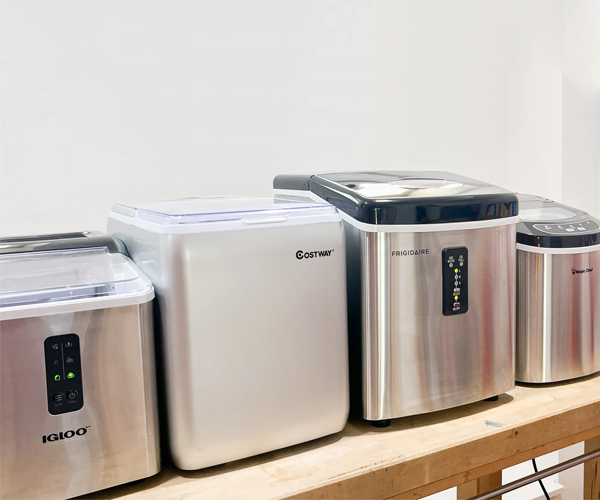
Benefits of Using Reverse Osmosis Water:
- High Purity: RO water is free from almost all impurities, resulting in clear, high-quality ice. This is particularly beneficial if you live in an area with poor water quality or if your tap water contains high levels of contaminants.
- Enhanced Taste: By removing chlorine and other chemicals, RO water ensures that your ice doesn’t impart any unwanted flavors to your drinks .
- Healthier Ice: With harmful substances like lead and arsenic removed, the ice produced is much safer for consumption, reducing the risk of waterborne diseases and other health issues .
Considerations and Best Practices:
- Potential Sensor Issues: Some ice makers rely on the mineral content in the water to detect its presence. Since RO water lacks these minerals, the sensors may fail to detect the water, leading to operational issues. To mitigate this, consider mixing a small amount of tap water with RO water to maintain the necessary conductivity .
- Corrosive Nature: RO water can be slightly corrosive, potentially damaging any copper piping in your ice maker. It’s crucial to ensure that your appliance is compatible with RO water or use materials that can withstand its purity .
- Pressure Requirements: RO systems typically reduce water pressure, which might affect the performance of your ice maker. Ensuring adequate pressure or installing a secondary storage tank can help maintain consistent ice production .
Alternative Water Options
If RO water isn’t suitable for your setup, consider these alternatives:
- Filtered Tap Water: This is generally the best all-around option, providing a balance of purity and necessary minerals for proper ice maker function. Using a high-quality filter can remove most contaminants while retaining essential minerals.
- Distilled Water: While it produces clear ice, distilled water might not be detected by some ice makers due to the lack of minerals. Mixing it with tap water can solve this issue.
- Bottled Water: A convenient and reliable option, though it can be more expensive over time. Ensure the bottled water isn’t overly mineralized to avoid scale buildup
In summary, the best water for your home countertop ice maker depends on balancing purity and the mineral content needed for optimal machine performance. Filtered tap water is generally recommended, while RO water can be used with careful considerations to avoid sensor and pressure issues. Regular maintenance and water changes are essential to ensure the best ice quality and extend the life of your appliance.
Best Practices
Regular maintenance is key to ensuring the longevity and optimal performance of your home countertop ice maker. Here are some detailed best practices to help you maintain your ice maker and produce high-quality ice consistently:
- Regular Cleaning:
- Interior Cleaning: Clean the interior of your ice maker every two months, or more frequently if used heavily. Use a solution of vinegar and water (1:1 ratio) to wipe down the interior, focusing on areas prone to mineral buildup and mold. For stubborn deposits, a soft-bristled brush can help reach tight corners .
- Exterior Cleaning: Wipe the exterior with a damp cloth and mild detergent. Avoid abrasive cleaners that can damage the finish. Regularly cleaning the exterior helps maintain the visual appeal of your ice maker.
- Water Quality:
- Filtered Water: Use filtered water to reduce impurities and contaminants that can affect ice quality and cause mineral buildup. Filtered water ensures your ice is clean and tastes great .
- Regular Water Changes: Replace the water in your ice maker regularly, ideally every 24 hours, to prevent the water from becoming stale and affecting the taste of your ice.
- Descaling:
- Descaling Solution: Run a descaling solution or a vinegar-water mixture through the ice maker periodically to remove mineral deposits. Follow the manufacturer’s instructions for the best results. Descaling keeps the machine running efficiently and prevents issues like reduced ice production and clogged nozzles .
- Smart Storage:
- Proper Storage Conditions: When not in use, store your ice maker in a cool, dry place away from direct sunlight and extreme temperatures. This helps prevent damage to the machine and ensures it’s ready for use when needed .
- Emptying the Machine: Always empty and dry the ice maker before storing it. This prevents mold and mildew growth inside the machine during periods of inactivity .
- Using the Right Products:
- Approved Cleaning Agents: Use cleaning agents recommended by the manufacturer to avoid damaging the machine or tainting the ice. Regular use of the appropriate cleaning products helps maintain the ice maker’s efficiency and hygiene .
Maintaining your home countertop ice maker involves regular cleaning, using high-quality water, descaling, and proper storage. These best practices ensure that your ice maker remains efficient, produces clean and tasty ice, and lasts longer. By following these steps, you can enjoy the convenience of having fresh ice on demand while protecting your investment.
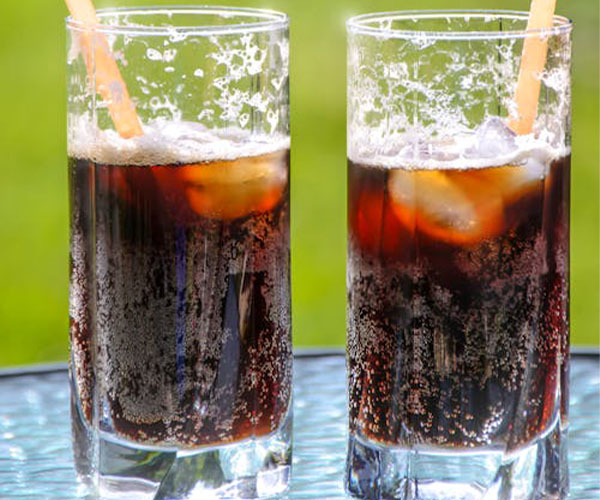
FAQs
1. What type of water is best for a home countertop ice maker?
Filtered tap water is generally the best option for home countertop ice makers. It balances mineral content and purity, ensuring optimal performance and ice quality. Filtering tap water removes contaminants like chlorine, heavy metals, and bacteria, which can affect the taste of ice and the efficiency of the ice maker .
2. Can I use distilled water in my countertop ice maker?
While distilled water can produce clearer ice, it might interfere with some ice maker sensors due to the lack of minerals. These sensors rely on the conductivity provided by minerals to detect water levels. Mixing distilled water with tap water can solve this issue, providing the benefits of distilled water while maintaining sensor functionality .
3. Is bottled water a good choice for my ice maker?
Bottled water is a convenient option and ensures consistent quality. However, it can be more expensive than tap or filtered water. Additionally, bottled water may have varying mineral content, which could lead to scaling over time if the mineral levels are high. It’s important to choose bottled water with low mineral content to prevent buildup in the ice maker .
4. How often should I change the water in my ice maker?
It is recommended to change the water in your ice maker every 24 hours. Regularly replacing the water prevents it from becoming stale and ensures the ice produced is fresh and clean. This practice also helps in maintaining the efficiency and hygiene of the ice maker .
5. What maintenance is required for a home countertop ice maker?
Regular cleaning and maintenance are crucial to keep your ice maker running efficiently. This includes:
- Cleaning the water reservoir: Use a mixture of white vinegar and water or a commercial cleaner to prevent mold and bacteria buildup.
- Descaling: If using water with high mineral content, descaling the machine every few weeks can prevent mineral deposits.
- Changing filters: If your ice maker has a built-in filter, replace it according to the manufacturer’s recommendations to ensure optimal performance .
Conclusion
In summary, the best water for your countertop ice maker largely depends on the balance between purity and mineral content. Filtered tap water is generally the most recommended due to its balance of cleanliness and necessary minerals. Distilled and reverse osmosis water can also be used but may require mixing with tap water to ensure sensor functionality. Regular maintenance and water changes are crucial for optimal performance and ice quality.
Call to Action
For more tips and expert advice on maintaining your countertop ice maker and choosing the best water, visit our blog at www.homesolutionzone.com. Explore our comprehensive guides and reviews to make the most out of your kitchen appliances!

